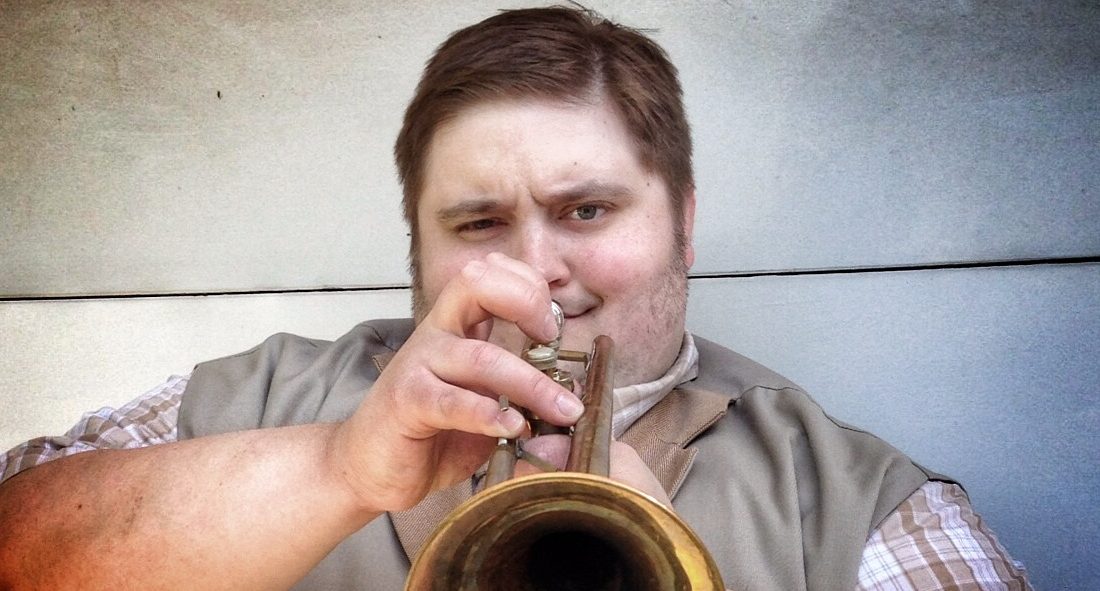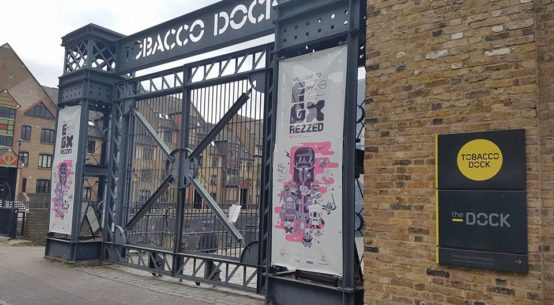
Sam Hughes speaks to composer, John Robert Matz about his award-winning work on Fossil Echo (Check out our review HERE) and more! John Robert Matz is a Chicago-based performer, arranger, composer, and music educator. Classically trained, he graduated with honors from Elmhurst College, majoring in music education, but with an emphasis on brass and vocal performance. As a composer, he has incorporated his educational multi-disciplinary musical training throughout his works, performing a variety of wind, brass, string and percussive instruments in his game and film scores, and using his knowledge to stretch instrumental timbres and find new sounds.
He is known for his work on video game scores as diverse as the BAFTA-nominated “Gunpoint”, “Artemis: the Spaceship Bridge Simulator”, “Rodina”, and the award-winning “Fossil Echo”, as well as being a regular musical contributor to YouTube’s “RocketJump” (and now Hulu’s “RocketJump: The Show”). In addition, he is also active in writing concert works for band and orchestra. As a performer, he has sung in Chicago’s Symphony Center, New York’s Carnegie Hall, on multiple “Final Fantasy: Distant Worlds” concerts, including the “Distant Worlds II” album recording, toured as an operatic vocal soloist in Italy and central Europe, and has played trumpet in several Chicago-area musical ensembles, including serving as principal in the Elmhurst Philharmonic Orchestra.
John Robert is a member of the Materia Collective, ASCAP, and the Game Audio Network Guild, and has recently been honored with two awards in the 2017 G.A.N.G. Awards, earning “Best Interactive Score” for his work on “Fossil Echo”, and being named “Rookie of the Year” for 2017.
In his spare time, he enjoys worrying about his Steam backlog, reading good books, and removing cats from his MIDI controllers. He is currently working on music for the upcoming games “For the King”, and “Dad by the Sword”.
Read the full interview below:
Before we get into your work on Fossil Echo, would you be able to tell us a bit about your journey to becoming a composer?
Certainly!
My route to where I am now, (like me, arguably) is a little bit eccentric. I grew up in a musical household; my mother was a soprano and my father was a trumpet player. I was raised on classical music, musical theatre, and film scores. Music was baked in from an early age.
In college, I decided to go into music education, in part because I had had an excellent and incredibly inspiring band director throughout grade school. Between his tutelage and my collegiate music theory professor, I started to dabble in composition, mostly as homework assignments and the like, and, in my freshman year In college, I put that to use scoring an absurdly ambitious student film adaptation of a story from J.R.R. Tolkien’s “The Silmarillion”. The movie, alas, never saw the light of day, despite its nearly two-hour running length (nearly all of which I scored), but a connection with its director led to a chance to audition to score an independent film set during the American Civil War; ample fodder for a musical imagination.
Whilst I made it to the final round of selections, I didn’t get that job, but by then the composition bug had well and truly struck, and I ended up reworking my themes into a stand-alone piece of program music for wind ensemble, with a coming of age story based around the Battle of Shiloh, a piece I was fortunate enough to conduct with my college’s top concert band. It was received impossibly well, and I thought, as a senior in college about to graduate with a degree in music education, “maybe, just maybe I can do this for a living, too.” A year later I was teaching high school music part time and taking a gamble on a pitch that would turn into my first video game score: “Artemis: The Spaceship Bridge Simulator”.
More specifically, what made you focus more on game soundtracks as an avenue?
As anyone who’s heard my concert music might begin to surmise, I’ve always had a special place in my heart for stories, and the music that enhances them. Programmatic musical works (music that tells a story, paints a picture, etc.) have always tended to be among my favorites, and as a child and young adult I devoured books and films at an amazing pace. I feel that games handle music/story interaction on yet another level; not just accompanying the action on screen in the manner of a film or piece of theatre, or just reacting and responding to player action, but also subtly exerting a tiny bit of control over a player’s emotional state, pushing them in the direction the game needs them to go. I find that incredibly exciting. Also, there’s the whole fantastical worlds aspect. Where else might you get to write music for a futuristic trenchcoated detective, or a submersible exploring a hostile alien sea, or a mysterious land floating amongst the clouds? As a composer, worlds like these are incredibly inspiring. In addition, there’s a certain wonderful spirit of encouragement and camaraderie in the game audio community that makes it, honestly, one of the greatest things to be a part of. It’s not mentioned much, but game audio people are the best people.
So when starting on Fossil Echo what brief were you given and how much detail about the game did you receive? For example, did you receive a build at all?
I was fortunate to be brought in early enough to work on the game whilst large sections of it were still storyboards and sketches. Phil Crifo, our designer and artist, had a solid vision for what the game was supposed to be, and talked about the game world being a “fantastical version of Earth” with a “strong ‘mythological’ dimension” to it, whilst avoiding actual magical elements. A few discussions led me to a basic outline of the kind of textures and instruments I might use, focusing on grounded, acoustic instruments of wind, wood, and skin, with minimal use of metals. (Brass, for example, is only used at climactic moments.) In the end, I worked mainly from descriptions, sketches, and, later, screenshots of semi-complete levels, along with, as levels became playable in our XNA-based engine, footage captured from gameplay, and videos of our hand-animated cutscenes. I wouldn’t actually get to play the game from beginning to end until a few months before launch.
If you could sum up your approach in terms of the player’s experience, how did you intend to affect the player?
The music of Fossil Echo serves two purposes outside of setting the tone for a scene or sequence. First, it acts as a voice for the characters in the game. Very early on the decision to have no dialogue, text, or written language was made, and the music got the job of literally telling the story of the player character and the others he meets along the way. Second, the score is geared to directly affect the player’s emotional state; it works to relax and soothe them when dealing with the incredibly difficult trials in the temples, for example, whilst psyching the player up during more intense sequences. Structural decisions were made to enhance that effect as well; for example, deaths and restarts don’t interrupt the music in normal gameplay, allowing the player to slip into a try/retry state with less frustration.
Here’s a playlist of tracks from Fossil Echo for you to have a listen to:
When writing the music for Fossil Echo what would you say your biggest influences were?
Hmm… A tough call. I tried rather hard to make it sound like nothing else out there, but I’d be remiss if I didn’t mention Austin Wintory’s phenomenal score for “Journey”, which in addition to just being generally inspiring, gave me some ideas for the tone I wanted to take. Also, I feel obliged to mention Gustaf Grefberg’s score for “Brothers: a Tale of Two Sons”, an incredible game from which I’m fairly certain some timbral elements were absorbed. Other bits might have sprung from my love of Howard Shore’s scores for “The Lord of the Rings”, elements of the violin writing from James Newton Howard’s score for “The Village”, and so on and so forth. The list could eventually encompass all the music I’ve heard and loved throughout my entire life, so perhaps we should cut it there?
The soundtrack has some very interesting elements woven throughout, were any of the instruments recorded live or are they all sample libraries?
Many of the solo instruments were, in fact, live, performed and recorded by me in my basement studio. Early on, I decided to hold myself to a rule of always having at least one live instrument playing at any given time, and I began to collect and inherit from family members a bunch of interesting instruments. Over the course of the project, I would sing and play an array of instruments, including Irish whistles and flutes, German recorders, dulcimers, various hand percussion, weird windchimes, kalimba, strange folk lyres, and other things to create the sounds of the world of Fossil Echo. In addition, I contacted a good friend of mine, Michaela Nachtigall, who is an amazing violinist, to lend her skills to the project, which she did with virtuosity and aplomb, bringing my score to life in a stunning fashion.
Both the music and sound design in Fossil Echo are quite texturally rich, were there ever any issues with your choice of instruments being similar to and clashing with some of the sound effects? If so, how did you get around these issues?
As I scored the game, I took as much care as I could to make sure that my orchestrations would complement the sound design and generally stay out of the frequencies where it was most important (conversely, Gordon McGladdery and Em Halberstadt did a wonderful job making sound design that complimented my music). The only area I was actively concerned about was in the percussive musical stings for events like guards spotting you, player death, etc.. Because those were, effectively, bits of score that I had orchestrated using the exact same instruments as I used in creating the mainline cues, I was concerned that, if a sting were triggered at the wrong moment, it could sound more like a musical error than an intentional stinger. To combat that concern, I incorporated some more unique elements into the stings, to further differentiate them from any similar sounds in the score, and made sure that during sequences where repeated player death was likely (the temples, for example), that similar percussive sounds were avoided in the score.
Were there any moments in the game that were particularly tricky to score to?
Yes, but only in a technical sense. “The Ladder” sequence was one of my favorite pieces to compose; a unique example of the designer saying “write something and we’ll build the game around it”. The player character, for the first time in the game, finds themselves with a completely linear path forward, and only the choice of whether to ascend or to stand still. When they climb, the music is allowed to unspool, but when they stop, a complex series of repeats, “stasis” sequences, and alternate variations play to allow the main thematic ideas to stay in sync with the player character’s movement through a stunning environment. It was a special kind of nightmare on the implementation side.
Is there anything you’ve done differently with Fossil Echo that you wish you’d done or weren’t able to do on previous video game projects?
Fossil Echo was my first effort that used middleware (Fmod, in our case) and the first time I did music implementation myself. In previous scores I’d designed the music to be interactive or reactive (Artemis: The Spaceship Bridge Simulator had a notably complex reactive system in play), but actually implementing the music in the game was handled on the other side of the fence. In this case, I was able to exert very fine control over how I wanted music to function in-game; building exact transitions, loop, and connective material, and making sure they operated as intended.
Do you have any particular favourite parts of the game involving your music?
Outside of the aforementioned Ladder, I really enjoyed the music around the areas I thought of as “The Savannah” (On the soundtrack “Sunset on the Savannah” and “From the Roots to the Boughs” are good examples). The art there paints everything in this lovely amber light, there are these beautiful splashes of color here and there, and I’m rather fond of the musical motif that weaves itself through that section. There’s also something about the cutscene “The Old Man and the Great Owl” which I love-oh, and the music for the caves; really just about everything from that bit of the game seems the most magical to me, but then again, it’s a bit like choosing a favorite child, not an easy task.
OK, so a fun question to finish off with! If you could hang out with anyone, alive or dead, who it would be?
What a question to go out on! There are so many interesting and fascinating people to choose from, countless composers, authors, historical figures, and scientists with whom I’d love to chat; I don’t think I can possibly choose just one. So I won’t. Here’s a smattering of people whom I’d love to get to sit down and learn from: Leonard Bernstein, Igor Stravinsky, J.R.R. Tolkien, J.S. Bach, Terry Pratchett, and John Williams. Sorry for the cop-out answer; there are so many more that deciding is nigh on impossible.
Thank you very much for the chance to sit down and chat with you. I’m glad you enjoyed our work; Fossil Echo was an amazing project to be a part of, and an absolute dream to get to write.
LINKS
Official
Soundcloud
We hope you enjoyed the interview, feel free to check out more of these at the Interviews page. Also, don’t forget to sign up to our Monthly Newsletter to make sure you don’t miss anything!
If you’re feeling generous there’s also our Patreon page, where you can get EARLY ACCESS to these interviews before they go live on the site.
We appreciate all the support!
The Sound Architect




